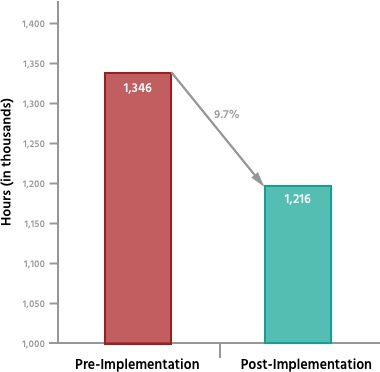10% decrease in service interruption hours
Total hours trains held reduced 9.7%
Strategic Intent
Increase ROI by effectively absorbing increased customer volume without additional resources or capital investments
Situation
- $15 billion North American Class I railroad
- Operates 32,000 route miles in the U.S. and Canada
- Demand for freight services growing as customers switch from trucking to lower-cost rail
- Client must quickly increase internal capacities by optimizing asset and resource utilization
- Management has sense of urgency around this issue
Issues and Barriers
- Poor planning, scheduling and inconsistent reporting result in unnecessary train delays and lost capacity
- Internal resources unable to develop new planning tools
- Dispatch management spends too much time on process flow, resulting in excessive train crew on-duty time
- Current reporting process contains excessive time-consuming paper reports and conflicting data from differing sources
Key Implementations
- Increase visibility of service interruptions and delays
- Streamline reporting processes to ensure more consistent and accurate data
- Process for data archiving and analysis
- Planning and scheduling process that’s easily converted into web-based, automated system
- Follow up all new processes with one-on-one coaching to ensure full understanding and compliance
Results
Total Hours Trains Held Reduced 9.7%

- Train delays reduced over 5%
- Coal volume increases 4%
- Service interruption hours decrease 10%
- Total hours held reduced 9.7%
- Excessive crew overtime reduced by 7%
Client Perspective
“The coal planning process has enabled the Coal Desk to optimize loading at the mine, resulting in improved daily train loading.”
— Regional Vice President, Operations
“My organization can now utilize their time planning and following up on deliveries and not creating many redundant reports and communications.”
— Director, Grain Operations